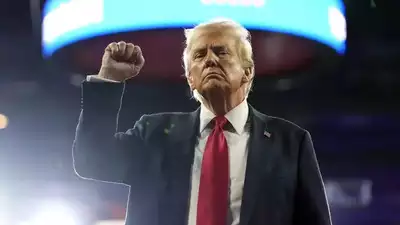
Newly appointed US president Donald Trump announced plans to impose
25 percent tariffs
on imports from the two major US trading partners, Canada and Mexico starting from February 1.
He accused the two nations for not failing to tackle illegal immigration and the flow of narcotics into the United States, and pledged to use tariffs extensively as a foreign policy measure.
Speaking in the Oval Office hours after being sworn in,Trump said, “We're thinking in terms of 25 percent on Mexico and Canada, because they're allowing vast numbers of people -- Canada's a very bad abuser also -- vast numbers of people to come in, and fentanyl to come in.”
In his inaugural address, he emphasised that he would rather impose taxes and tariffs on foreign nations to benefit US citizens, rather than burdening Americans for taxes.
Early Monday, he vowed: "I will immediately begin the overhaul of our trade system to protect American workers and families."
Trump’s return to the White House has reignited his previous calls for aggressive tariff policies. He had already proposed additional duties, including a 10 percent hike on Chinese goods, with even steeper rates of up to 60 percent, on imports from nations he accused of unfair trade practices or inadequate action on illegal immigration and drug trafficking.
As per US trade data, Mexico, Canada, and China were among the United States' largest trading partners.
'America First'
The White House separately announced plans to introduce the "
America First Trade Policy
."
On Monday, the president also signed a directive aimed at tackling the country’s cost-of-living crisis, with focus on reducing housing costs and other everyday expenses.
Trump reiterated his intent to create an "external revenue service" to collect tariffs and duties, claiming it would pour in "massive amounts of money" for the country. The initiative is a twist on the Internal Revenue Service (IRS), which aims at administering and enforcing US tax laws.
International reactions
International reactions to Trump’s tariff plans have been cautious. Canada’s foreign minister, Mélanie Joly, stated that Ottawa would prepare to respond to any US trade policies, while the EU’s economy commissioner also promised to defend European interests.
Critics have warned that higher tariffs could, in turn, lead to increased consumer prices and hurt economic growth. A 2021 tax foundation report noted that tariffs typically burden businesses and consumers, though it found no evidence of driving economy-wide inflation.
More proposals
Despite these warnings, Trump supporters have also pointed to his other proposals, such as tax cuts and deregulation. Commerce secretary nominee Howard Lutnick suggested companies relocate manufacturing to the US in order to avoid duties.
However, treasury secretary nominee Scott Bessent dismissed concerns that tariffs would impact domestic consumers.
Trump also announced plans to establish a "department of government efficiency" (DOGE) to identify and implement $1 trillion in federal spending cuts, reinforcing his commitment to fiscal responsibility.

 1 day ago
2
1 day ago
2










 English (US) ·
English (US) ·